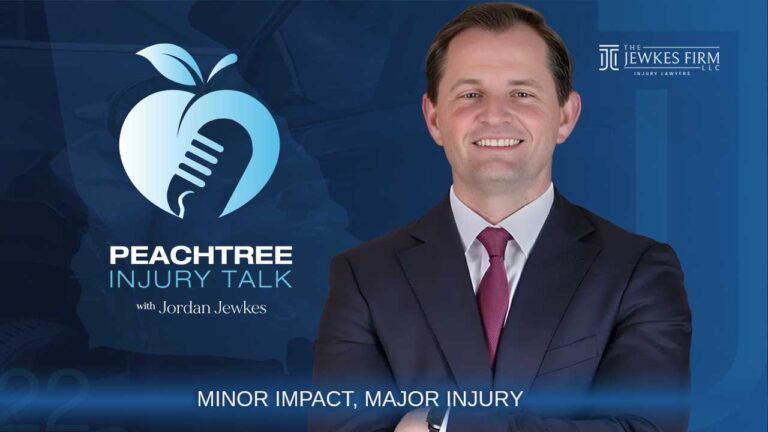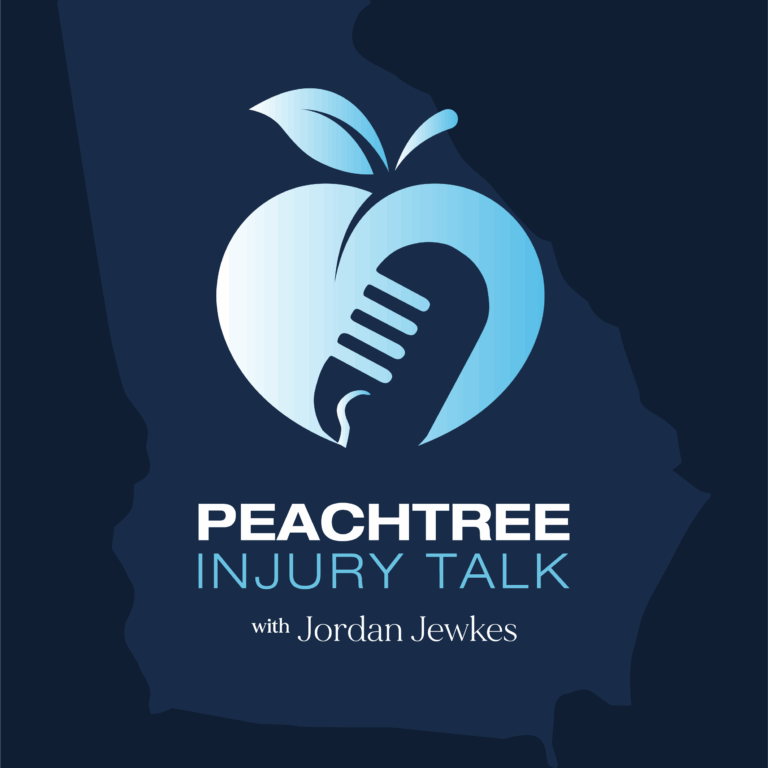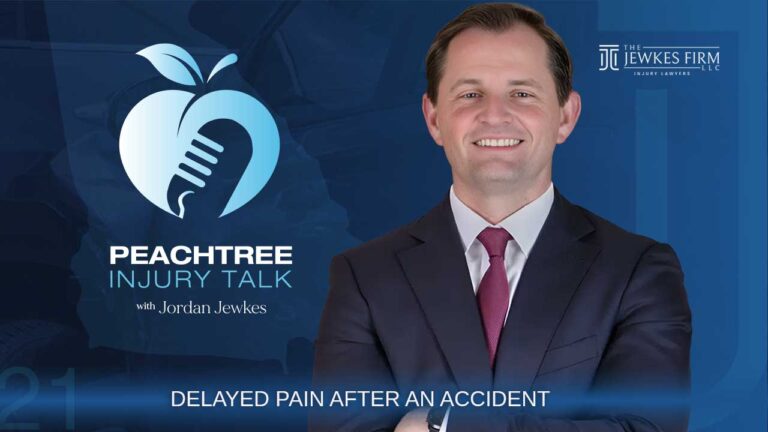
Minor Impact, Major Injury — Why “Small” Accidents Can Still Cause Big Problems
In this episode of Peachtree Injury Talk, attorney Jordan Jewkes from the Jewkes Firm discusses the reality of injuries resulting from low-speed car accidents. Despite
Home | Podcasts | Peachtree Injury Talk | How Insurance Companies Use Your Words Against You
Peachtree Injury Talk with Jordan Jewkes
In this episode of Peachtree Injury Talk, attorney Jordan Jewkes discusses how insurance companies use recorded statements to deny or reduce car accident injury claims. Drawing on his experience as a former insurance defense lawyer, Jordan explains that insurers seek early statements to establish fault and limit payouts. He warns claimants about the risks and common mistakes when giving these statements and advises caution, especially with the other party’s insurer. While your own insurer may require a statement, you have the right to request legal counsel and delay giving it. Jordan highlights how attorneys protect clients during this process and handle situations where damaging statements exist. He emphasizes the adversarial nature of insurance claims, controlled communication, and the need for early legal help to protect rights and treatment. The episode concludes with practical tips: avoid admitting fault, assume conversations are recorded, and consult an attorney promptly.
This episode offers a comprehensive understanding of the risks involved in recorded statements and stresses the strategic importance of legal advocacy in insurance claims after car accidents. It equips viewers with practical knowledge to protect themselves from common pitfalls and improves their chances of a just outcome.
| 00:00 | Narrator: Welcome to Peachtree Injury Talk with attorney Jordan Jewkes. |
| 00:05 | Evan Mack: Welcome to Peachtree Injury Talk with attorney Jordan Jewkes. Jordan Jewkes is committed to giving injury victims a voice and advocating for them against a system that often works against their best interests. With years of experience as a seasoned trial lawyer and former insurance defense attorney, Jordan uses his insider knowledge to fight for injury victims throughout Georgia. I’m Evan Mack, and today we’re discussing how insurance companies use recorded statements to deny claims, and what you need to know before you speak. Welcome, Jordan! |
| 00:35 | Jordan Jewkes: Thanks, Evan! I’m glad to be here. |
| 00:38 | Evan Mack: Great to have you! Today’s episode is called Recorded and Denied: How Insurance Companies Use Your Words Against You. Let’s dive right into it. To start, Jordan, can you explain what a recorded statement is and when insurance companies usually ask for one after a car accident? |
| 00:53 | Jordan Jewkes: Sure, Evan. First, let me give some context. The primary goal of insurance companies is to minimize the value of your claim and, in some cases, deny it altogether. To do that, they need evidence—photos, police reports, and, of course, recorded statements from the parties involved in the accident. A recorded statement is simply a verbal account of the incident, often taken by the insurance company to build their file. In car accident cases, this usually involves statements from both drivers and potentially any witnesses. The purpose of these statements is to gather evidence, so the insurance company can assess the claim and determine if they’ll approve it or deny it. |
| 02:17 | Evan Mack: That makes sense. So, why are insurance companies so eager to get people on record so quickly? What are they really looking for? |
| 02:22 | Jordan Jewkes: Great question. Insurance companies need to establish fault, which is their first priority. In a typical car accident, you’ll have two drivers—Driver A and Driver B. The police are usually called to the scene, and they’ll make an initial assessment of who’s at fault. However, that assessment isn’t binding for the insurance company. They conduct their own investigation and can make a different determination. If it's unclear who is at fault—say, if both drivers are pointing fingers or if the police report isn't conclusive—the insurance companies will use recorded statements to clarify the facts. This helps them figure out who’s responsible for the accident. The second thing they look for is which coverage applies—whether there’s additional insurance involved, and then they look at the severity of the injuries to gauge potential exposure and liability. |
| 04:22 | Evan Mack: That makes sense. Now, what are some common mistakes people make when giving a recorded statement that could end up hurting their claim later? |
| 04:32 | Jordan Jewkes: The biggest mistake people make is giving a recorded statement to the other party’s insurance company. Even if you feel confident about what happened, it usually does more harm than good. The fact that it’s recorded means it can be used against you later—especially in court. If someone came to me after an accident, I’d tell them right away: Don’t speak to the other driver’s insurance company without consulting an attorney first. This is similar to how people are read their Miranda rights when arrested: Anything you say can and will be used against you. Insurance companies want to catch people saying things like, "I’m sorry this happened", or "I think it was partially my fault." These kinds of statements can seem harmless at the time but can be used against you later, especially if you change your story or develop more serious injuries after the fact. For example, you might say you felt fine right after the accident, but then a few days later you’re dealing with back pain or discover you have a herniated disc. That initial statement could be used to challenge your injury claims later on. |
| 07:04 | Evan Mack: Wow, can an innocent comment, like “I feel fine” or “I didn’t see the other car,” really hurt someone in court or in settlement negotiations? |
| 07:13 | Jordan Jewkes: Absolutely. In legal terms, words matter. And credibility matters. What you say early on can be held against you, even much later in the process. If you make a statement to the opposing insurance company, they can use it in court. So it’s important to be very cautious. Having an attorney who can guide you through this process is crucial. You want to make sure you’re not unintentionally hurting your case. |
| 08:09 | Evan Mack: So, if an insurance adjuster calls and asks for a recorded statement before someone’s had a chance to speak to a lawyer, what should they do? |
| 08:17 | Jordan Jewkes: The first thing they should do is ask to speak to an attorney. I always recommend that my clients not give a statement until they’ve had the chance to consult with me. Now, if it’s your own insurance company, the situation is a little different. Most policies require you to cooperate, which includes giving a statement if asked. However, you can always request to speak with an attorney before doing so. You can schedule that statement for a later date, usually within 30 days, giving you time to get proper legal advice. On the other hand, if it’s the other driver’s insurance company calling, you don’t have to give a statement at all. You have every right to tell them, “I’m not speaking to you until I’ve consulted with my attorney.” |
| 09:50 | Evan Mack: Are there any legal requirements that force you to provide a recorded statement? And does it make a difference if it’s your insurance company versus the other driver’s? |
| 10:00 | Jordan Jewkes: Legally, you don’t have to provide a recorded statement to the other driver’s insurance company. It’s entirely voluntary. If you refuse, it might delay the process, but they can’t legally force you to give it. However, with your own insurance company, it’s different. While the law doesn’t require you to provide a recorded statement, your policy likely does. Refusing to cooperate could lead to your insurance company denying your claim or even canceling your coverage. So if you want to maintain coverage and continue with your claim, you’ll need to provide the statement. |
| 11:38 | Evan Mack: How do you, as an attorney, protect your clients during this process or respond when a damaging statement has already been made? |
| 11:47 | Jordan Jewkes: That's what we do every day. If a client has already given a damaging statement, the first thing we do is request a copy of the transcript from the insurance company. Once we have it, we review it carefully and, if necessary, provide additional clarification or context to address any inconsistencies or errors. We’ve seen this happen countless times—clients initially say “I feel fine” right after the wreck, but later find out they have more serious injuries. We can usually fix the narrative by explaining that injuries don’t always show up immediately. Most people understand that true injuries can take time to manifest. |
| 13:58 | Evan Mack: Jordan, do you have a real case you can recall where a recorded statement either helped or hurt a client’s case? |
| 14:08 | Jordan Jewkes: It happens regularly. The truth is, if insurance companies operated in good faith, they’d be focused on helping victims recover, paying medical bills, and providing fair settlements. But that’s not how they usually operate. They often focus on closing claims quickly to minimize their costs. And that's where things get tricky for claimants. For example, I’ve had clients who thought their injuries would go away in a few days, so they gave a recorded statement saying they felt fine. But then, weeks later, their condition worsens, and they’re referred to a specialist. Unfortunately, the insurance company holds them to that initial statement, offering a minimal settlement based on what was said early on. |
| 16:09 | Evan Mack: Finally, Jordan, what’s your best advice for someone who’s just been in an accident and wants to make sure they don’t say the wrong thing or miss anything important? |
| 16:21 | Jordan Jewkes: Be kind and compassionate, but don’t admit fault. It’s okay to say, “I’m sorry this happened,” but don’t make any statements about being at fault or claiming you’re fine unless you’re 100% sure. When the insurance calls start, be cautious about giving a recorded statement. Remember, these conversations can be recorded and used against you later. It’s important to be diligent, stay honest, and engage a lawyer as soon as possible. The sooner we can step in, the better we can help you get the treatment you need and protect your interests. |
| 17:42 | Evan Mack: Thanks, Jordan, for all the great advice today! |
| 17:45 | Jordan Jewkes: Anytime, Evan! It’s always a pleasure. |
| 17:48 | Evan Mack: And thank you all for tuning in to Peachtree Injury Talk with Jordan Jewkes. To connect with Jordan and his team, visit jewkesfirm.com. Don’t forget to like, subscribe, and leave a review. See you next time! |
| 18:07 | Narrator: Thanks for watching. Be sure to hit that like and subscribe button and leave us a review in the comments. |

Peachtree Injury Talk is a podcast by Kevin Rosenquist featuring legal insights and practical advice from Georgia-based attorney Jordan Jewkes. The show focuses on personal injury law, offering listeners expert guidance on navigating insurance claims, understanding legal processes, and protecting their rights after an accident. Each episode dives into real-life case examples, common challenges injured individuals face, and actionable tips for dealing with insurance companies and legal hurdles.
Episode Summary
In this episode of Peachtree Injury Talk, attorney Jordan Jewkes from the Jewkes Firm discusses the reality of injuries resulting from low-speed car accidents. Despite minimal visible damage to vehicles, occupants can suffer serious injuries like whiplash and lower back pain due to the way forces transfer to the body during a crash. Insurance companies often deny these claims by pointing to the lack of obvious vehicle damage, but medical evidence, expert opinions, and diagnostic imaging such as MRIs play a crucial role in proving injury. Jewkes emphasizes that modern cars absorb impact by flexing, sometimes hiding damage beneath bumpers, and that repair costs don’t necessarily reflect injury severity. He advises anyone experiencing symptoms after a minor collision to seek prompt medical attention and legal advice, as timely action is vital to securing fair compensation.
Timestamps
00:00 – Introduction to Peachtree Injury Talk
00:29 – Can Someone Be Seriously Injured in a Minor Accident?
01:42 – Common Injuries in Low-Impact Collisions
03:32 – Why Insurance Companies Downplay Injuries in Low-Damage Accidents
04:26 – Proving Injury Despite Minimal Vehicle Damage
06:18 – Challenges in Getting Fair Compensation & Supporting Scientific Evidence
07:59 – Real Case Experiences & Assessing Vehicle Damage Under $1,000
09:48 – Role of Diagnostic Imaging (MRI, CT) in Injury Validation
10:59 – Advice for Those Feeling Worse After Low Impact Crash
11:49 – Closing Remarks and Contact Info
About the Show
Peachtree Injury Talk is hosted by attorney Jordan Jewkes, who is dedicated to giving injury victims a voice and fighting for their rights against an often unfair system. Each episode provides valuable legal insights and practical advice for those navigating personal injury claims.

Recorded and Denied — How Insurance Companies Use Your Words Against You features a discussion between Evan Mack and Attorney Jordan Jewkes about the risks of giving recorded statements to insurance companies after a car accident. Jordan Jewkes, an experienced trial lawyer and former insurance defense attorney, explains how insurance companies use recorded statements to minimize or deny claims.
The conversation starts with Jordan explaining what a recorded statement is: a verbal account of the accident provided by the parties involved, often taken by the insurance company to assess the claim. Insurance companies use these statements to gather evidence, establish fault, determine which coverage applies, and evaluate the severity of injuries.
Jordan discusses why insurance companies are eager to get these statements quickly, particularly to establish fault when it’s unclear who is responsible for the accident. The recorded statement serves as a tool to clarify the facts when police reports or initial assessments are inconclusive. The insurance company also seeks to evaluate the injury claims, which could impact the settlement or claim decision.
A significant portion of the discussion addresses common mistakes made by claimants when giving recorded statements. Jordan highlights the danger of speaking to the other driver’s insurance company without consulting an attorney first. Anything said in the statement, even seemingly innocent comments like “I’m sorry this happened” or “I feel fine,” can later be used against the person, especially if their injuries worsen over time. This can lead to reduced settlements or damage their credibility in court.
Jordan emphasizes the importance of caution when dealing with recorded statements, advising people to consult an attorney before providing one, especially when it’s the other driver’s insurance company requesting it. If it’s your own insurance company, the situation is different, as most policies require cooperation, but consulting an attorney beforehand is still recommended.
The video explains that while you are not legally obligated to provide a recorded statement to the other driver’s insurance company, refusing to cooperate with your own insurance company could result in denial of the claim or cancellation of coverage. If a damaging statement has already been made, Jordan describes how he works with clients to address and correct the narrative, providing context or clarification to mitigate any negative impact.
The discussion concludes with Jordan’s best advice: Be cautious and avoid admitting fault or downplaying injuries. It’s important to remain polite but refrain from making statements that could hurt the case. Engaging an attorney as soon as possible ensures that your rights are protected and that the best possible outcome is achieved. Jordan reminds viewers that recorded statements are serious and should never be given without proper legal counsel.
The video provides valuable insights into how recorded statements can impact personal injury claims and stresses the importance of legal guidance to navigate the process. For more information, reach out to The Jewkes Law Firm at (770) 771-5130.
This show is designed to deliver general information regarding the law. Our guests will not provide tailored legal advice. If you have a personal issue and need legal support, get in touch with us for a free consultation with a Jewkes Firm attorney.
Subscribe to our newsletter for essential updates and expert legal advice.

In this episode of Peachtree Injury Talk, attorney Jordan Jewkes from the Jewkes Firm discusses the reality of injuries resulting from low-speed car accidents. Despite

In this episode of Peachtree Injury Talk, attorney Jordan Jewkes discusses the common issue of delayed pain following car accidents. He explains that symptoms often

In this episode of Peachtree Injury Talk, attorney Jordan Jewkes discusses the legal considerations parents should know if their child is injured in an accident.
Welcome to Peachtree Injury Talk—your essential podcast for navigating the often bewildering landscape of personal injury law.
Jordan Jewkes shares real-life cases, common pitfalls to avoid, and tips on securing the compensation you deserve.
Tune in to Peachtree Injury Talk.
The information you obtain at this site is not, nor is it intended to be, legal advice. You should consult an attorney for advice regarding your individual situation. Contacting us does not create an attorney-client relationship.
